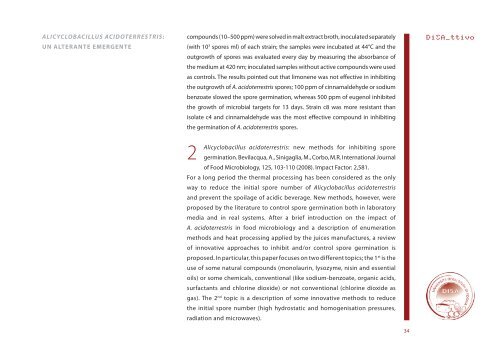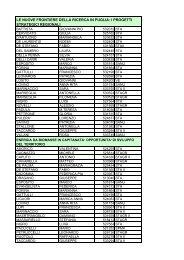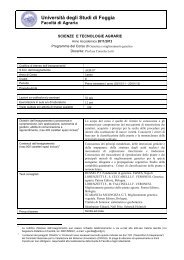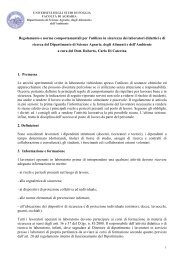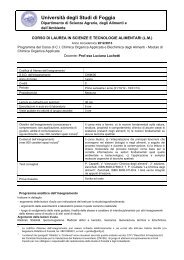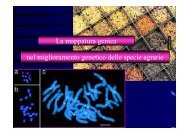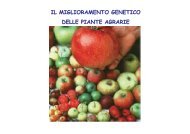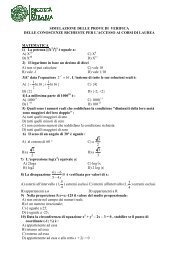DiSA_ttivo © DiSA - Università degli studi di Foggia - Agraria ...
DiSA_ttivo © DiSA - Università degli studi di Foggia - Agraria ...
DiSA_ttivo © DiSA - Università degli studi di Foggia - Agraria ...
Create successful ePaper yourself
Turn your PDF publications into a flip-book with our unique Google optimized e-Paper software.
AlicyclobAcillus Acidoterrestris:<br />
un alterante emergente<br />
compounds (10–500 ppm) were solved in malt extract broth, inoculated separately<br />
(with 10 3 spores ml) of each strain; the samples were incubated at 44°C and the<br />
outgrowth of spores was evaluated every day by measuring the absorbance of<br />
the me<strong>di</strong>um at 420 nm; inoculated samples without active compounds were used<br />
as controls. The results pointed out that limonene was not effective in inhibiting<br />
the outgrowth of A. acidoterrestris spores; 100 ppm of cinnamaldehyde or so<strong>di</strong>um<br />
benzoate slowed the spore germination, whereas 500 ppm of eugenol inhibited<br />
the growth of microbial targets for 13 days. Strain c8 was more resistant than<br />
isolate c4 and cinnamaldehyde was the most effective compound in inhibiting<br />
the germination of A. acidoterrestris spores.<br />
2 Alicyclobacillus<br />
acidoterrestris: new methods for inhibiting spore<br />
germination. Bevilacqua, A., Sinigaglia, M., Corbo, M.R. International Journal<br />
of Food Microbiology, 125, 103-110 (2008). Impact Factor: 2,581.<br />
For a long period the thermal processing has been considered as the only<br />
way to reduce the initial spore number of Alicyclobacillus acidoterrestris<br />
and prevent the spoilage of aci<strong>di</strong>c beverage. New methods, however, were<br />
proposed by the literature to control spore germination both in laboratory<br />
me<strong>di</strong>a and in real systems. After a brief introduction on the impact of<br />
A. acidoterrestris in food microbiology and a description of enumeration<br />
methods and heat processing applied by the juices manufactures, a review<br />
of innovative approaches to inhibit and/or control spore germination is<br />
proposed. In particular, this paper focuses on two <strong>di</strong>fferent topics; the 1 st is the<br />
use of some natural compounds (monolaurin, lysozyme, nisin and essential<br />
oils) or some chemicals, conventional (like so<strong>di</strong>um-benzoate, organic acids,<br />
surfactants and chlorine <strong>di</strong>oxide) or not conventional (chlorine <strong>di</strong>oxide as<br />
gas). The 2 nd topic is a description of some innovative methods to reduce<br />
the initial spore number (high hydrostatic and homogenisation pressures,<br />
ra<strong>di</strong>ation and microwaves).<br />
34<br />
<strong>DiSA</strong>_<strong>ttivo</strong>


